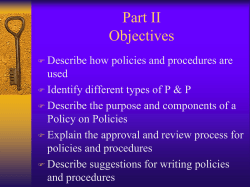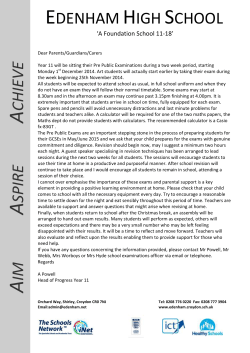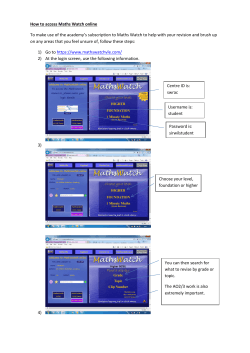
here - Penketh High School
MKB Date: May 2015 Dear Parent/Carer As the examination season begins, I am writing to update you on key dates and procedures that apply to both year 12 and 13 students over the coming weeks. It is crucial that all KS5 students prepare fully and to assist them in their preparations for these exams the students will be given study leave from College. At the end of the letter I have included revision information which I hope will prove useful in their preparations. Arrangements for Year 12 Students Students are required to attend their lessons until their course has completed with their AS examination. On completion of all of their exams, students do not need to return to College to start their A2 courses until Monday 8th June, when College will officially resume sixth form lessons and Monday morning briefings. Arrangements For year 13 On Friday 15th May students will attend their college leaver’s prom and celebrate their achievements and hard work over the past two years. Students will return to college on the 18th May and continue to attend lessons for the remainder of their last week. On Friday 22 nd May year 13 students will officially leave Penketh College returning to complete their exams in accordance with their exam timetable. On behalf of Penketh College we would like to thank you for your support over the last year. We look forward to celebrating the outcomes of this summer’s GCEs with the sixth form students on Thursday 13th of August at 10am. Yours sincerely Mr M Billington Miss S E Ashurst Head of Sixth Form – Curriculum Head of Sixth Form – Personal Development Information to help prepare effectively for examinations: 1. If you have not done so already, make sure you prepare an exam revision timetable. Plan short spells of revision, about 30 minutes to an hour at a time, as this is the most effective way to learn. Your concentration lapses after about an hour and you need to take a short break of about ten minutes. 2. When you prepare your revision timetable, make sure you plot in your school timetable, your exam dates, and the things you don’t want to miss out on. Let’s face it, you will still want to see that Saturday football match or go to your friend’s birthday party. Make it part of your planning. 3. There are some good resources which will help you plan your timetable, such as phone apps like Class Timetable and Exam Countdown website, which also has lots of other useful advice. 4. Build reward time into your timetable. For instance, a full day of revision could equal a trip to the cinema. 5. Don’t spend ages making the timetable, or your revision notes, look pretty. Exam timetables are great as long as they don’t become a revision avoidance technique. 6. Find somewhere quiet to revise – your bedroom, school, your gran’s house – and refuse to be interrupted and distracted. 7. Don’t revise in front of the television, or while listening to the radio. Sit at a proper table or desk if you can. Bed isn’t a great place to revise as snoozing is far too tempting. 8. Always start by revising the most difficult topics while you are fresh rather than using your best concentration on the more straightforward ones. 9. Do mix up how you approach revision by trying different techniques. Try some of these: Make your own learning mind maps – either on paper or use something like iMindMap or Popplet apps. If it works for you make flash cards. Write the facts on one side and some questions on the other and then test yourself. Try apps like Flashcards+ and StudyBlue. Make your own revision notes, either on paper or using one of the many notes apps. Make electronic or paper Post-it notes for key things you keep forgetting and put them where you will see them – on your tablet, PC, mirror, phone etc. Read your revision notes out loud. We remember more than twice as much when we read aloud compared to when we read silently. Practise on past exam papers and revision tests. There are lots available on the web. Initially, do one section at a time - and progress to doing the entire paper against the clock. Note down things you still don’t understand so that you can ask your teachers to talk you through them. Never be embarrassed to ask. Stay in good health. Eat a balanced diet, exercise (it keeps your brain active) and get enough sleep. And finally, good luck!
© Copyright 2025










